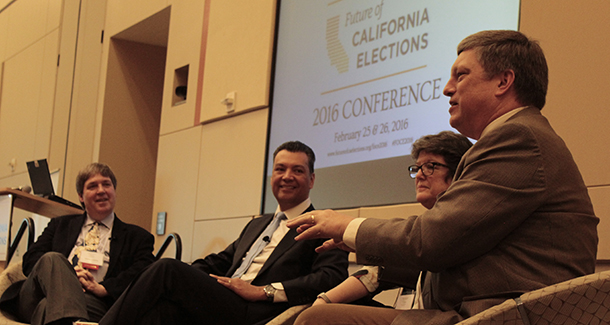
Panelists at last year's Future of California Elections Conference, including California Secretary of State (second from left). (Photo Credit: John Guenther)
The Future of California Elections (FoCE) annual conference this week promises an interesting look forward at how Californians will cast their ballots in the near future — and a look back at how America voted in 2016.
While there will be some discussion about President Trump’s discredited claims about voter fraud in the 2016 election, the FoCE Conference will concentrate, among other critical election topics, on how California will implement SB 450, the Voter’s Choice Act, which will usher in some big changes in how many Californians vote.
“This is the most important election reform in many years and we need to get the implementation right,” said Vince Hall, FoCE executive director. “The implementation of SB 450 and how we prepare voters for the impending changes will be a main emphasis at this year’s conference.”
The California Voter's Choice Act was signed by the Governor in September of last year and allows certain California localities to move from offering traditional precinct-site voting to an election system using a combination of vote-by-mail (VBM) balloting and “vote centers.”
Under the new system, every voter will receive a ballot in the mail. This would allow someone who works in one part of a county and lives in another to fill out the ballot and drop it off at a voting center of his or her convenience up to 10 days prior to election.
“Outreach and education are going to be very important as we move into this new era of voting,” said Hall. “We’ll be talking quite a bit about that.”
In addition, as it always does, FoCE will be concentrating on other issues that impact the vote, like the California Voting Rights Act, making sure voting is accessible for people with disabilities and those who don’t use English as their primary language, and how more California youth can be pre-registered and inspired to participate in the electoral process.
California Secretary of State Alex Padilla will kick off the conference, which will be held all day Thursday, March 9 at the California Endowment in Los Angeles.
The closing discussion, moderated by John Myers of the L.A. Times, will feature the election reform experience of other states. As alternative systems like the vote center model gain popularity, the election community is gaining insight into where, when and how voters want to cast their ballots.
“We can learn from efforts like early voting in Nevada and the implementation of open-source voting systems in Austin, Texas,” said Hall.
Dana DeBeauvoir, the county clerk of Travis County, Texas, and Joseph Gloria, registrar of voters for Clark County, Nevada, are among the out-of-state experts who will take part in the final session.
The keynote address will be given by David Becker, executive director at the Center for Election Innovation & Research. The topic is, well, topical: “Diagnosing our Democracy in the Age of Trump.”
You may remember soon after the November election, then President-elect Trump claimed widespread voter fraud had occurred. He cited a report issued by Pew Research in 2012 as his source. Becker was the author of the report and spent a lot of time speaking with the national media to state that the Pew Report said no such thing.
The report did find problems with inaccurate voter registrations, people who registered in more than one state, and deceased voters whose information was still on the rolls.
CA Fwd spoke with Becker at a previous FoCE Conference about improving California's election performance. Becker shared how states can improve and clean up their registration systems by joining the Electronic Registration Information Center, or ERIC, a system that helps participating states identify eligible voters who are not already on the rolls or voters whose information has changed.
Just this week, House Oversight Committee Chair Jason Chaffetz, a Utah Republican, said his committee won’t consider the claims of voter fraud by President Trump. “I don’t see any evidence of that,” Chaffetz said.
The Future of California Elections annual conference brings together election administrators, community organizations, and reform advocates to discuss the latest developments in the field of elections. The 2017 conference will be your chance to learn about ways to serve our diverse electorate as well as an opportunity to engage with election colleagues from across California.
After 2016, this year's gathering promises to be an especially interesting conversation.
The Future of California Elections Conference is supported by the James Irvine Foundation.

